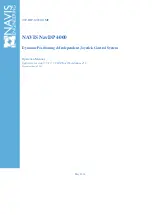
System Principles and Functionality
Figure 1.2:
NAVIS NavDP 4000
Coordinate systems
N
north
E
east
X
the bow direction axis placed at midship line and parallelly to the still-water surface
Y
the starboard direction axis placed at midship line and parallelly to the still-water surface
Z
the vertical axis as perpendicular to the the still-water surface
HDG
heading
V
the vessel course and speed vector
Vx, Vy
proper projections of velocity
The diagram contains also the current, wind and waves directions references.
1.2.1
Vessel Model
The base of the
NAVIS NavDP 4000
system is a mathematical model describing the vessel’s moving as a function of
the forces applied to. The vessel model is applied to get a noise free estimation of the vessel position, heading and speed.
A lot of parameters such as vessel mass, draft, hull form, propulsion type and arrangement, superstructure and location
etc are used in the model.
1.2.2
Wind Model
A wind model is used to calculate the wind forces and moment as a function of the wind speed and direction. The
model is based on the aerodynamic vessel description, and includes a set of coefficients for various angles of attack. So,
the wind speed and direction values mentioned above, as well as the vessel heading, are used to calculate the wind induced
forces in the surge and sway axes and the moment. Information about the wind induced forces and moment is then used
to implement a feedforward loop into the overall control signal.
1.2.3
Thruster Model
A thruster model is based on thruster hydrodynamic characteristics. This model uses the feedback signals from the
thrusters calculating thruster forces.
Doc. 000.JDP-10000-OME, rev.3.3.13/“2102.$–17A-Advanced”
12




























